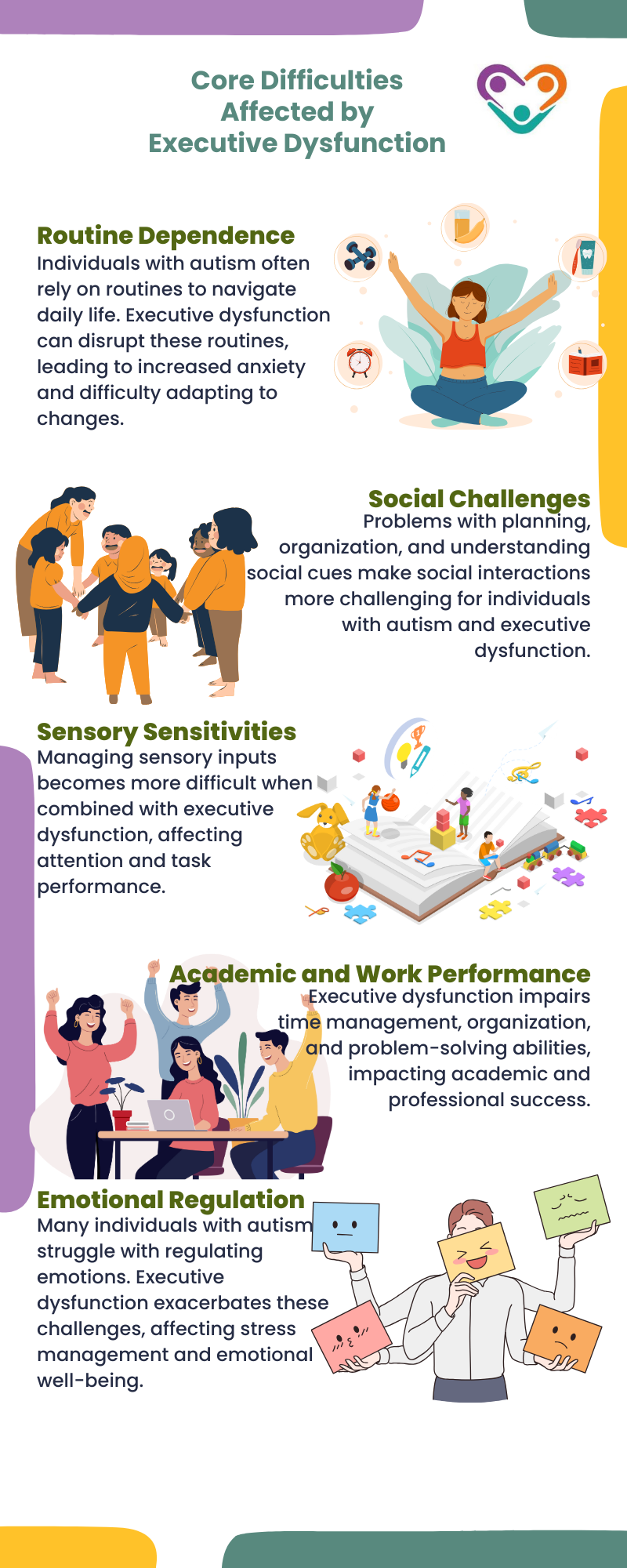Executive dysfunction refers to difficulties in a set of mental skills crucial for everyday tasks, such as managing time, paying attention, planning, organizing, remembering details, and controlling impulses. These skills, collectively known as executive functions, are essential for achieving goals and maintaining a structured life.
When these functions are impaired, it significantly impacts a person’s ability to lead a productive and organized life. It’s worth noting that executive dysfunction is commonly observed in various neurological conditions, including autism spectrum disorder (ASD).

Signs of Executive Dysfunction
Executive dysfunction manifests in several key signs, which can vary in severity and impact. These signs are as follows:
Difficulty Initiating Tasks
One of the hallmark signs of executive dysfunction is difficulty initiating tasks. Individuals may struggle to start tasks, experiencing procrastination or feeling overwhelmed by the prospect of beginning something new. This initiation difficulty can hinder productivity and lead to delays in completing important activities.
It often stems from challenges in cognitive flexibility and planning, where individuals find it hard to break down tasks into actionable steps.
Issues with Planning and Organization
Planning and organizing tasks can be particularly challenging for individuals with executive dysfunction. They may have trouble creating a plan or arranging tasks in a logical sequence. This difficulty can result in missed deadlines, forgotten appointments, and overall disorganization in daily life.
For example, someone may have difficulty prioritizing tasks or may spend excessive time on one aspect of a project while neglecting others.

Poor Time Management
Another common feature of executive dysfunction is poor time management. Individuals may struggle with estimating how long tasks will take or allocating time effectively to different activities.
This can lead to rushed work, incomplete tasks, or spending disproportionate amounts of time on less important activities. Difficulties in time management often stem from challenges in working memory and prioritization.
Forgetfulness
Problems with working memory contribute significantly to forgetfulness in individuals with executive dysfunction. They may have difficulty remembering important details, appointments, or tasks they need to complete.
Despite their efforts to stay organized through lists or reminders, they may still struggle to retain and recall information when needed. This forgetfulness can impact both personal and professional responsibilities, causing frustration and stress.
Challenges with Multitasking
Managing multiple tasks simultaneously is another area of difficulty for those with executive dysfunction. Individuals may find it overwhelming to switch between tasks or prioritize competing demands. They may struggle to maintain focus and productivity when faced with multiple responsibilities, leading to inefficiencies and incomplete work. This challenge often reflects difficulties in cognitive flexibility and task switching.
Impulsivity
Difficulties in inhibitory control can lead to impulsivity in individuals with executive dysfunction. They may act without fully considering the consequences of their actions or decisions.
This impulsivity can manifest in various contexts, such as spending money impulsively, making hasty judgments, or interrupting others in conversations. Impulsivity can impact personal relationships, academic performance, and professional success.

Emotional Regulation Difficulties
Effective emotional regulation is an essential aspect of executive function. Individuals with executive dysfunction may struggle to manage their emotions, leading to frequent mood swings, irritability, or emotional outbursts. They may find it challenging to cope with stressors or regulate their responses in social situations. These difficulties can affect relationships and overall well-being, contributing to additional stress and anxiety.
Difficulty Following Instructions
Understanding and following complex or multi-step instructions can be challenging for individuals with executive dysfunction. They may have difficulty sequencing tasks or remembering all the steps involved in a process.
This challenge can impact their performance in academic, work, or daily living settings, as they may struggle to complete tasks accurately and efficiently.
Executive Dysfunction in Autism
Autism spectrum disorder (ASD) is characterized by challenges in social interaction, communication, and repetitive behaviors. Many individuals with autism also experience executive dysfunction, which can exacerbate their core difficulties:

Recognizing and understanding the signs of executive dysfunction is essential for supporting individuals affected by this condition, particularly those with autism spectrum disorder. By identifying these signs early and implementing appropriate strategies and supports, it is possible to help individuals manage their difficulties effectively and improve their overall quality of life.
Continued research and awareness are crucial for developing tailored interventions that address the unique needs of individuals with executive dysfunction, promoting independence, success, and well-being across various aspects of life.
Sources:
https://www.additudemag.com/executive-function-disorder-in-adults-symptoms
https://www.additudemag.com/what-is-executive-function-disorder
https://www.autismparentingmagazine.com/executive-dysfunction-autism
https://nfil.net/executive-functions/10-signs-you-may-struggle-with-executive-dysfunction



